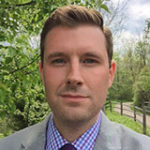Don McClure, St. John’s University – Skilled Practice in Teacher Education
 On St. John’s University Week: Best way to train new teachers? Get ‘em in the classroom.
On St. John’s University Week: Best way to train new teachers? Get ‘em in the classroom.
Don McClure, assistant professor in the department of curriculum and instruction at St. John’s University, discusses how this can create a more shared agenda in teacher education.
Donald R. McClure, Ph.D., is an assistant professor in the Department of Curriculum and Instruction in the School of Education at St. John’s University. He holds his Ph.D. in Curriculum, Instruction, and Teacher Education from Michigan State University; his M.Ed. from the University of Notre Dame; and his Bachelor of Music from Central Michigan University. McClure also served as an elementary and middle school teacher for eight years in Louisiana, Illinois, and Ireland. McClure’s research interests span the areas of social studies education and international education. He explores how culturally and ethnically diverse students make sense of citizenship, national identity, and national belonging.
Skilled Practice in Teacher Education
In today’s increasingly globalized and interdependent world, it’s more important than ever for schools to prepare students for creative thinking and problem solving. This means that teacher candidates, or those preparing to be teachers, must have the opportunity to experience the reality of the classroom in order to understand how to put theory into practice. However, one challenge in providing this kind of opportunity for teacher candidates is a divide that currently exists in teacher preparation programs between professional knowledge and skilled practice. Some scholars have conceptualized professional knowledge in terms of content area knowledge that teachers should have in order to teach subjects such as history or math. Other scholars have focused on the importance of teachers increasing their knowledge of and about their students’ diverse backgrounds to inform their curriculum and instructional planning. Still others have conceptualized professional knowledge in terms of knowledge about technology that teachers use to create meaningful curriculum. Similarly, skilled practice in teaching has been conceptualized in different ways. For example, teacher education scholar Magdalene Lampert (2010) described four different understandings of skilled practice including (1) practice in contrast to theory; (2) teaching as a collection of practices; (3) practice for future performance; and (4) the practice of teaching. Although these understandings are related, there are still differences between them that can affect the way teacher preparation programs are structured. In order to bridge the existing divide between professional knowledge and skilled practice in teaching, educators must first bridge divides that exist within each concept. In so doing, educators can create a more shared agenda in teacher education. It is important for educators and others to be aware of existing intra-concept understandings in order to bridge the divide between professional knowledge and skilled practice. This, in turn, can help ensure that today’s teacher candidates will be prepared for the challenges of 21st -century classroom teaching.


